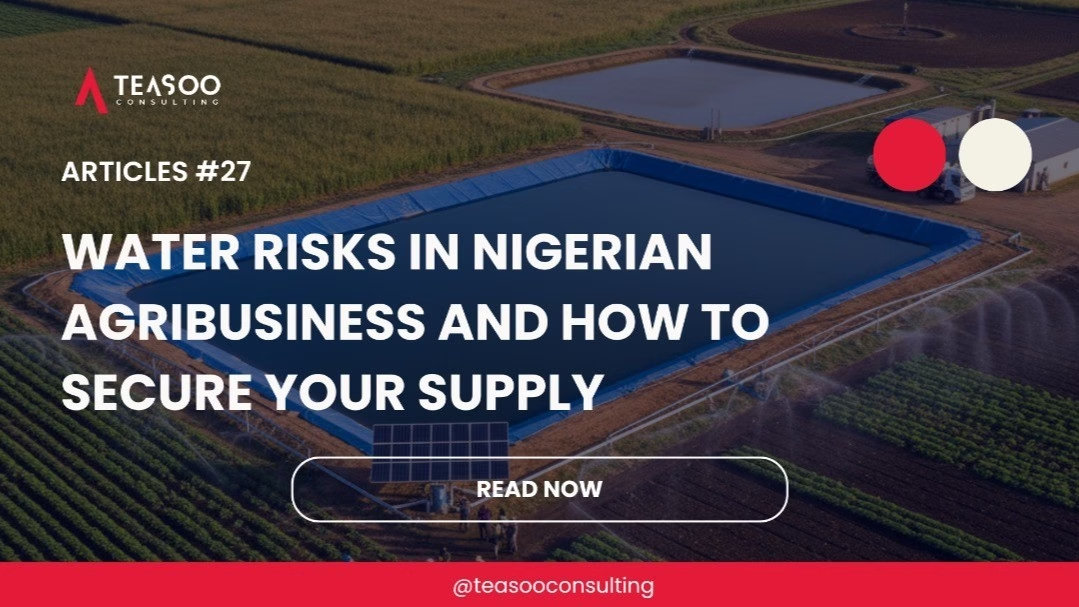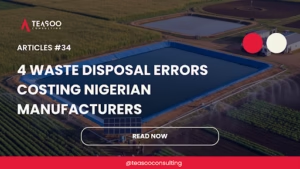
Water scarcity and declining quality are quietly reshaping Nigerian agriculture. From rice paddies in Kebbi to cassava fields in Edo and tomato processors in Kano, farmers and agribusinesses are already feeling the impact.
For agribusinesses and processors, water risk is not a distant climate issue but a daily operational challenge. As rainfall patterns shift, aquifers decline, and pollution intensifies, ensuring access to clean, reliable water is becoming as vital as access to land or credit.
The Rising Tide of Water Risk
Nigeria’s agricultural sector consumes over 70% of the nation’s freshwater resources, yet less than 5% of cultivated land is irrigated.
Erratic rainfall, inefficient irrigation, and contamination from agricultural runoff and industrial effluents are eroding both water availability and quality.
These trends manifest in multiple ways:
- Reduced yields and quality losses during dry spells. Farmers in the Jos Plateau region face up to 10 dry spells annually, causing drought stress that cuts yields by 30-35%, with rice farmers being the hardest hit due to high water needs
- Higher production costs as farms depend on boreholes and water trucking. In Ogun State, aquifers near poultry clusters show signs of stress from farming activities, raising concerns about groundwater depletion and increased operational costs due to deeper boreholes.
- Processing disruptions due to water scarcity or contamination. In Kano, Tomato processing facilities experience seasonal disruptions linked to water scarcity and Sugarcane farmers in Benue relying on river water are increasingly affected by upstream pollution and siltation
Without deliberate adaptation, these water pressures will continue to undermine agribusiness profitability and national food resilience.
Building Water Resilience: Farm-Level Actions
The first line of defence begins on the farm. Many practical, low-cost measures can significantly reduce water risk:
- Conduct a Water-Risk Assessment: Map all water sources and usage points. Identify peak demand periods, vulnerability to droughts, and pollution risks.
- Adopt Smart Irrigation Systems: Drip or sprinkler systems, moisture sensors, and timed irrigation schedules can reduce water use by up to 40%.
- Improve Soil Health: Organic mulching, composting, and cover cropping improve moisture retention and reduce irrigation frequency.
- Harvest Rainwater: Simple catchment systems and farm ponds store runoff for dry-season use.
- Reuse and Recycle: Treat and reuse wastewater in processing plants where possible.
- Integrate Water Metrics into ESG Reporting: Track and disclose water use, efficiency gains, and local watershed impacts to strengthen sustainability credentials.
Securing the Future of Nigerian Agribusiness
Water stewardship is not only an environmental imperative, it’s a business resilience strategy.
Companies that act now to assess, conserve, and collaborate will be best positioned to thrive in a water-stressed future.
In Nigerian agribusiness, secure water means secure harvests and sustained profitability.
At Teasoo Consulting, we help agribusinesses, processors, and investors turn water and climate risks into long-term resilience strategies.
Through ESG integration, water-risk assessments, and sustainability planning, we support clients to secure their supply chains and their future.






